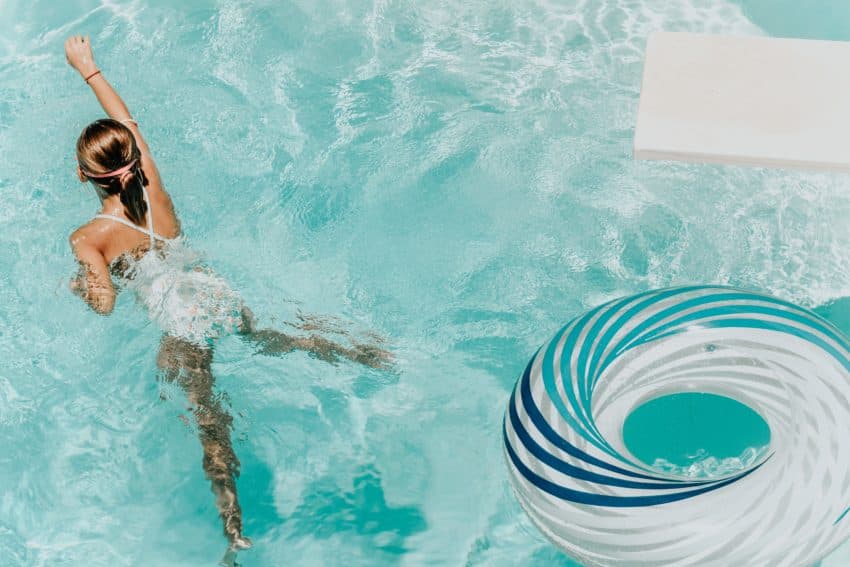If you have ever seasoned your food with salt, drunk tap water, or swum in a pool, you have been exposed to chlorine.
What is chlorine and why is it added to swimming pools and spas?
Chlorine is a chemical element that has a variety of uses and it is the most effective chemical used in swimming pools and spas to sanitize the water.
It works to kill harmful microorganisms that could cause health-related problems.
Chlorine is commonly used as a water disinfectant and can be found in many household cleaning products, like bleach, which is frequently a chlorine based solution of sodium hypochlorite.
Believe it or not, chlorine is a principle component in the salt we eat everyday (NaCl), the Cl is the chlorine.
Chlorine is a naturally occurring element usually found bonded to other elements in rocky compounds, and can be found in all of the world’s oceans and swimming pools.
How does chlorine work in your swimming pool or spa?
The good guys against the bad guys: A short story about chlorine’s war on algae
Think about the chlorine as the ‘good guys’ attacking the algae which are the ‘bad guys’. When the chlorine attack the algae, they end up combining with the bad guys (because they’ve been attacked) and turn into what chemists call combined chlorine. Rationally, when the good guys are free to fight, chemists call them free chlorine.
One may think that the ‘good guys’ can go and attack the ‘bad guys’, but one would need armor for protection to fight in the field.
This is where the cyanuric acid comes into play. The cyanuric acid or ‘armor’ helps the chlorine remain stable to combat the bad guys.
Cyanuric acid is a chlorine stabilizer that fortifies chlorine’s armor by blocking the sun’s powerful UV rays that cause chlorine degradation. But, one must not get carried away with the armor, because too much will actually hinder the good guys, and cause what is called as chlorine lock.
What levels of chlorine do I need in my pool or spa?
To maintain a healthy pool or spa that is safe for swimming, consistent monitoring and sanitation measures are necessary. A
An ideal range for chlorine in a spa is 3–5 ppm and 1–3 ppm in a swimming pool.
If you maintain these chlorine levels for your pool or spa consistently, you’re guaranteed an easy and low-maintenance swimming season.
Not enough chlorine (below 1 ppm) may result in:
- Unwelcome microorganisms and bacteria like E. coli that are potentially hazardous to your health.
- Cloudy or green pool water.
- Costly extra maintenance.
Too much chlorine (above 10 ppm) may result in:
- A strong smell that most find unpleasant.
- Itchy sensations for some skin types.
- Bleaching of clothing from prolonged exposure to chlorine.
What are the different types of chlorine?
First, it is important to note that the active ingredient is very similar in all types of chlorine available. With a basic understanding of what types of chlorine are available, you will find that some of your choice boils down to personal preference.
1” tablets, 3” chlorine tablets and sticks are the exact same chemical compound. So whether you call it a tablet, a puck, or a stick you are getting the exact same product. Per pound the 3″ chlorine tablets are the most common and also the cheapest.
Granular chlorine:
Also referred to as ‘shock’, works just as well as the chlorine tablets described above. The difference between chlorine in the tablet and granular form is the concentration of the active ingredient. Granular chlorine, or shock, is more fast-acting and fast-dissolving than it’s tablet relative. What it lacks in potency it makes up with by having virtually no effect on your pool water pH level.
Liquid chlorine:
Although liquid chlorine is very popular and competitively priced, it is more susceptible to losing it’s punch from the day it is made, even if stored in a closed container. The higher the temperature and more sun exposure, the faster liquid chlorine will begin to degrade.
Salt water:
Contrary to urban myths, salt water pools do use chlorine. The chemical formula for salt is NaCl — the Na is sodium, and the Cl is chlorine. Stay tuned for more important information about the pros and cons of having a saltwater pool in another post coming soon.
Remember to be cautious with chlorine
When it comes to managing chlorine and other chemicals to balance your pool or spa water, safety around handling and storing the chemicals is very important.
Safety information about chlorine:
- Do not mix different chlorine types together, they will react violently.
- Follow all label instructions when transporting, storing and using chlorine.
- Never allow dirt or any foreign substance or debris to contact chlorine.
- Keep chlorine in a cool, dry location, away from children.
- Never allow any other pool chemicals to come in contact with chlorine.

